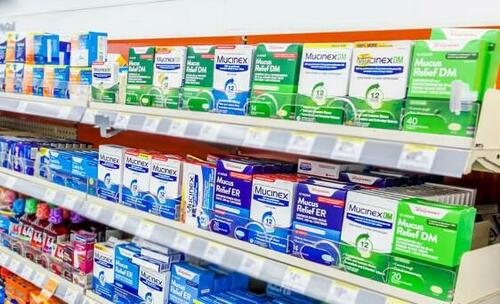
The cancer causing chemical benzene has been found in generic store-brand versions of Mucinex cold medicine, according to a new report by Bloomberg.
While both the brand-name and generic versions contain the same active ingredient, guaifenesin, and have similar packaging, the key difference lies in the inactive ingredients.
The brand-name medicine, made by Reckitt Benckiser, uses a benzene-free carbomer, while the generic versions sold by CVS, Walmart, Target, and Walgreens use a cheaper carbomer containing benzene to achieve the same 12-hour extended-release effect.
Bloomberg writes that despite international warnings, U.S. regulators have permitted the use of benzene in drugs for decades.
Recent tests have revealed dangerously high levels of the chemical in some U.S. products, sparking concern. The FDA announced plans to phase out benzene by 2025, but the deadline was extended to 2026 after pushback from the industry.
FDA spokeswoman Amanda Hills said: “The FDA is continuously working to ensure that all drugs meet the highest quality standards with the health and well-being of Americans top of mind.”
In response to questions about benzene in generic Mucinex, CVS Health said it would work with suppliers to replace the ingredient, the report says.
Walgreens stated it follows FDA regulations, while Walmart, Target, and Rite Aid did not comment. The FDA is studying gel-based drugs with carbomers but not tablets like generic Mucinex. Bloomberg said it found that other store-brand products, including pain relievers and moisturizers, also contain benzene-made carbomers.
Despite consumer trust in store-brand medicines, they aren't always as safe as brand-name versions. Major U.S. chains source their generic Mucinex from Amneal Pharmaceuticals, which did not comment on testing or compliance with future FDA rules.
Swapping benzene-containing carbomers is costly and time-consuming due to the need for additional testing and FDA approval. Prices for safer carbomers are higher, with Bloomberg noting a $4 price difference on Amazon between benzene-made and benzene-free versions.
The inventor of Mucinex, Jeff Keyser, asserts there's no scientific reason to use benzene-made carbomers, as safer alternatives are available.
The cancer causing chemical benzene has been found in generic store-brand versions of Mucinex cold medicine, according to a new report by Bloomberg.
While both the brand-name and generic versions contain the same active ingredient, guaifenesin, and have similar packaging, the key difference lies in the inactive ingredients.
The brand-name medicine, made by Reckitt Benckiser, uses a benzene-free carbomer, while the generic versions sold by CVS, Walmart, Target, and Walgreens use a cheaper carbomer containing benzene to achieve the same 12-hour extended-release effect.
Bloomberg writes that despite international warnings, U.S. regulators have permitted the use of benzene in drugs for decades.
Recent tests have revealed dangerously high levels of the chemical in some U.S. products, sparking concern. The FDA announced plans to phase out benzene by 2025, but the deadline was extended to 2026 after pushback from the industry.
FDA spokeswoman Amanda Hills said: “The FDA is continuously working to ensure that all drugs meet the highest quality standards with the health and well-being of Americans top of mind.”
In response to questions about benzene in generic Mucinex, CVS Health said it would work with suppliers to replace the ingredient, the report says.
Walgreens stated it follows FDA regulations, while Walmart, Target, and Rite Aid did not comment. The FDA is studying gel-based drugs with carbomers but not tablets like generic Mucinex. Bloomberg said it found that other store-brand products, including pain relievers and moisturizers, also contain benzene-made carbomers.
Despite consumer trust in store-brand medicines, they aren’t always as safe as brand-name versions. Major U.S. chains source their generic Mucinex from Amneal Pharmaceuticals, which did not comment on testing or compliance with future FDA rules.
Swapping benzene-containing carbomers is costly and time-consuming due to the need for additional testing and FDA approval. Prices for safer carbomers are higher, with Bloomberg noting a $4 price difference on Amazon between benzene-made and benzene-free versions.
The inventor of Mucinex, Jeff Keyser, asserts there’s no scientific reason to use benzene-made carbomers, as safer alternatives are available.
Loading…





